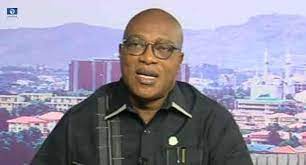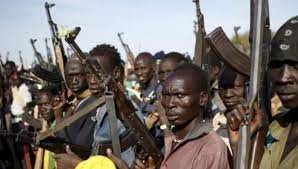A former director of the Department of State Service (DSS), Mike Ejiofor, has warned that danger lurking by in Nigeria which is capable of engrossing everyone if the leadership of the nation did not act fast.
In an appraisal on insecurity and the state of the nation, Ejiofor raised the alarm while delivering a paper on ‘Insecurity and Impunity in Present Day Nigeria: Is It an Unwitting Prelude to Restructuring or Fragmentation’, at a Webinar organized by The Rule of Law Development Foundation (ROLDF), on Monday, March 15.
He said the nation was at a crossroad where undesirable elements have declared war on anything Nigeria and the citizens have lost interest and confidence in their leaders and the country.
“A closer look at the unfolding recent security climate in Nigeria and the consequent regional and ethnic responses indicates a country that is at war with itself but seems oblivious of it due to extenuating factors and/or selfish primordial sentiments of the major actors. Otherwise, the hand writing is clearly written on the wall that danger is lurking by the corner and will engulf everyone unless we act fast”, Ejiofor warned.

Excerpts:
“Unfolding global events indicate that insecurity is neither new nor abnormal with man and his environment, neither is it peculiar with Nigeria. Every country despite the sophistication and technological advancement receives her fair share of security challenges in one form or the other and such are being resolved as they evolve.
However, the efforts and resources committed towards the resolution of such challenges may vary depending on the magnitude of the threats and commitment of the stakeholders. Nevertheless, it becomes worrisome when little problems are allowed to fester, develop into a moth hill and soon become near intractable to the point of threatening the sovereignty of the country.
Since 2008, issues bothering on insecurity have been the topic of almost every formal and informal discourse in Nigeria. The picture of insecurity evident in today’s Nigeria looks gloomy especially when juxtaposed with the impunity of the perpetrators.
This ranges from faceless Boko Haram terrorist elements, to marauding blood sucking Fulani militia/herdsmen, invading merciless bandits, confident armed robbers capable of engaging banks for hours despite security fortification, dare devil smugglers that can break through any Nigerian border security measure, ritualists snuffing lives out of unsuspecting persons for power or wealth; advance free fraud/yahoo boys, political gangsterism orchestrated by culpable politicians and the foot soldiers under their employ, sectarian and regional violent youth groups, amongst many others.
I need not remind myself nor bore you with the story of my kidnap. Since then, my slogan changed from ‘don’t pay ransom’ to ‘scout for money as much as you can’ and pay ransom. This is because, when in the hands of the captors, you are on your own as the provision of section 14-(2)-(b) of the 1999 Nigerian Constitution (as amended) is put on hold.
As gloomy and disillusioning as this appears, it is a sad reality. Some of us simply put up bold faces to defend this cause being firm believers in the Nigerian state hoping that someday, the relevant authorities will brace up to their responsibilities.
I speak from the point of experience having been a lucky victim, all thanks to God because the experience is better imagined. Some others did not enjoy such grace as I did because they were killed in the process. Despite the trauma, I could still picture the impunity, the confidence and the organizational competence displayed by my captors.
The topic of discourse raised very salient issues like impunity, insecurity, unwritten prelude to restructuring and fragmentation. Let us be on the same page as we look at these words closely.
Nigeria is a product of 1914 amalgamation of the Northern and Southern Protectorates by Sir Lord Luggard apparently, for the convenience of the British colonial masters. It is a multi-cultural, multi-religious and completely heterogeneous society which must be seen as such and accorded the associated nuances.
The nation had gone through harrowing political, religious and ethnic crisis especially in the post independence era. These crises including the civil war have resulted in losses running into millions of lives and unquantifiable worth of properties. Notwithstanding the traumatic journey, insecurity was within manageable limit.
One of the commonest undoing of the country is weak leadership coupled with impunity in crime, tribalism, religious intolerance and official corruption. All of these amongst others have stiffened her political and socio-economic growth. To this end, the country’s contemporaries like Malaysia, Pakistan, India and even Ghana amongst others have dwarfed her such that while some of them are nuclear powers, Nigeria is still struggling to feed its citizens and grapple with little domestic security problems.
The complexities of Nigeria and her seeming intractable problems borne out of self deceit and lack of patriotism and political will could be gleaned from public reactions both within and without. The pessimistic views and derogatory expressions of some Nigerians about Nigeria are alarming. All of these are borne out of frustrations occasioned by a daily unveiling hopeless tomorrow exacerbated by today’s security crisis and which of course, determines the prosperity or otherwise of any nation.
However, despite the country’s diversity, I am a strong proponent of a united in diversity and indivisible Nigeria because I perceive greatness, achievable only in an environment of equity, justice and patriotism.
Overview of Insecurity in Nigeria
From the pre Nigerian civil war till about late 90s, Nigeria could be adjudged relatively peaceful. Apart from fears of bad roads, armed robbery on the highways as well as AK47 wielding men of the Nigeria Police occasionally extorting money from commuters, one could travel the length and breadth of Nigeria without any fear of attack by AK47 carrying killers emerging from the bushes.
Then, despite the age long shortcomings of our police, they could talk tough and mean it as well as bark at and equally bite criminals. The impunity of today’s criminality readily provokes a reminiscence of the reign of terror by notorious armed robbers like Dr. Ishola Oyenusi of the Western Nigeria in the 70’s and Lawrence Anini of old Bendel state in the 80s etc. Though these criminal gangs held sway with impunity for a reasonable period of time with the usual complicity of the police, they and other insurrections that emerged here and there were quickly crushed before they became hydra headed.
In the 60s, the country was faced with post independence compromises and alignments to accommodate her diversities. Some of the inherent security threats include political crisis, corruption, ethnic bickering etc which lack of proper management of the nascent independence snowballed into a civil war.
The 70s and 80s witnessed post war consequences of proliferation of arms, armed robbery, continued sectarian/ethnic animosity and crisis, religious conflicts, increased official corruption, political violence, military dictatorship and its associated complications, civil/students’ agitations, etc.
In the 90s, there were increased political instability, electoral violence worsened by the annulment of 1993 election believed to have been won by MKO Abiola by General Ibrahim Babangida, armed robbery, regional agitations, religious crisis, sanctions by western countries, introductory kidnapping in the Niger Delta region, sectarian crisis etc.
Between 2000 and date, insecurity with impunity rather than abate progressed geometrically. Kidnapping in the Niger Delta region reached its crescendo and waned. The period birthed the worst security plague in the history of Nigeria; Boko Haram whose sole agenda is to Islamize the country or at worse carve out an Islamic caliphate in the north east Nigeria and end western education.
Also within this period, while newer menacing threats such as, kidnapping for ransom, banditry, invasion and sacking of communities, Ak47 carrying Fulani militia attacks, cattle rustling, mass protest against police brutality “#ENDSARS”, nationwide looting of ware houses and vandalization of public/private sector properties, Ebola, Covid19 pandemic emerged, older ones like; farmers/herders clashes, religious intolerance, official corruption, electoral violence, sectarian/regional agitations, armed robbery, youths’ unrests, food insecurity, etc. increased with much speed.
Presently, Nigerian highways are death traps not for fear of accidents occasioned by bad roads as have been the case but by threat of kidnappers, Boko Haram (BH) members, herdsmen, bandits, armed robbers all of which are worst than bad roads. Nigerian homes are no longer places where one can retire to after a busy work day as gun carrying dare devil men could visit. Schools, places of worship and hospitals are no longer sacrosanct or exempted from attacks by the invaders.
Since 14th April, 2014, after two hundred and seventy six 276 female students were kidnapped from Government Secondary School, Chibok, in Borno State by the Boko Haram terrorist group, more schools have suffered the same fate.
Nigerians are abducted daily, ransoms running into millions of naira and dollars are remitted to kidnappers/terrorist daily thereby empowering them for better strategy and procurement of arms for more daring attacks while many other victims are killed after collecting ransom, communities are sacked while unlucky ones are killed, farmers no longer enter the bushes to farm for fear of being attacked, law abiding and genuine herders now have “no go areas” else their cattle will be rustled, innocent souls perish in the hands of criminals, and we simply move on as if nothing is happening. Human lives do not appear to mean anything to us anymore.
One fundamental feature of these key criminal elements of the present dispensation is the seeming defilement of all local therapies. This is not unconnected with the fact that they are more daring, more sophisticated, more diversified, having more religious, ethnic and regional outlook, as well as having religious, ethnic and regional/international advocates and defenders. They also operate with witting and audacious impunity as if they are authorities on their own. Their activities have resulted in an overly divided Nigeria along ethnic and religious lines. Nigerians have lost interest and confidence in their leaders as well as in the country. Drums of war are being sounded from different regions of the country.
One recurrent decimal in the evolution of these security threats is that they are never completely decimated and followed through. Rather, the criminals or perpetrators are dislodged and as soon as relative calm returns to the areas, the government authorities retreat while the criminal gangs regroup and return with more intensity and viciousness.
We are now at a cross road where undesirable elements have declared war on everything Nigeria; education, youths, religious beliefs considered alien to their brand. According to the Global Terrorism Index 2020, Nigeria is the third most terrorized country in the world with about 1,245 deaths in 2019. Nigeria is ranked alongside; Afghanistan, Somalia, Syria and Yemen.
In the midst of these, some misguided or mischievous Nigerians are muting dialogue or amnesty for the criminals even when they are unrepentant. But I ask, after the dialogue and possible downing of weapons if ever, what happens to their victims’ wellbeing even those that were killed?
In my opinion, patronage of local vigilante groups, hunters as well as formation of regional security outfits, seeming lone choice of amnesty or dialogue for unrepentant criminals who hold the state hostage for no genuine reasons or cause are evidences of failing and overwhelmed security system.

How We Got Here
As earlier highlighted, the country has been bedeviled by injustice, corruption, religious and ethnic bigotry, lack of patriotic leaders, foreign meddling etc. All of these primordial sentiments amongst others contributed to our inability as a people to confront emerging problems. Consciously as well as unconsciously, we walked into the present security quagmire and now entangled. Some of the factors that brought us as a nation into this web are discussed below.
Government Insensitivity or Recklessness
Over the years, those in positions of leadership in Nigeria have not responded positively to the aspirations of those they lead. Rather, they engage in looting of public funds for self aggrandisement and abandon their mandate to offer quality leadership and direction to the ordinary people. Such leadership actions and inactions have helped to create the root causes of insecurity that bedevil Nigeria today.
Faulty Leadership Selection Process
In our sixty years of independence as a nation, we have had about thirty years of democracy thanks to twenty one years of uninterrupted civil rule from 1999. While the other years were by military men who shot their ways into dictatorial leadership, the years of democracy were equally not so fruitful due to faulty electoral processes which produced persons most of who were either very corrupt and cannot provide sane leadership or persons not groomed and ready for leadership or further still persons out rightly unfit for the positions they occupied.
Centralized Security Structure
The security structure operating in the country is too centralized and incapable of comprehensively meeting the security needs of the hinterland.
Ill Prepared Security Agencies
This is all encompassing and involves ill equipped agencies, ill trained personnel, poorly remunerated, highly compromised, and corrupt security enforcement agents.
Corrupt System
The corruption in the system is spoken of both within and outside the country. The establishment of financial crime agencies has not tamed this monster enough because even its operatives are equally not absolved from traits of corruption, compromises or political witch-hunt. Official corruption is one of the factors that brought Nigeria to her knees.
Lack of Strong Institutions
Nigeria has traditionally lost her values and in the same vein, built stronger individuals than institutions. Consequently, rather than collapse those individuals, institutions are collapsed. This has led to policy summersaults as national issues revolve around each contemporary strong man’s whims and caprices
Poverty
A corrupt system like ours, with weak leaders can only but produces unproductive and poor population. No wonder Nigeria is credited with the poverty capital of the world.
Religious and Ethnic Divide
Sometimes, we appear to deceive ourselves in Nigeria and this is one of the reasons why things are not working because we claim to be “on top of the situation” why in reality, we are drowning. It is irreligious and sinful to claim that Nigeria is not polarized along religious and ethnic biases because the evidences abound everywhere both in the formal and informal sectors, government and its agencies.
Poor Funding for the Security Sector
Funding for the security sector has been abysmally very poor. The personnel are poorly remunerated and mobilized. From such a people, not much can be achieved.
Misapplication and Mishandling of Military Operation: Areas that require outright military onslaught are either ignored or handled with kid gloves while areas with less threatening situations are visited with kinetic approaches.
Faulty Criminal Justice System: Every breach of the law is expected to attract a punishment in line with the laws governing that society to serve as deterrence to would be offenders. However, due to certain factors like corruption, lack of political will, lack of patriotism, biases, etc, justice has been miscarried and those who deserve sanctions are rewarded, while those who deserve commendation receive the hammer. This encourages impunity and increases insecurity.
Activities of Fifth Columnists
Rightly or wrongly, activities of fifth columnists both within and outside the country who do not want this country’s greatness to manifest are rife. A former Chief of Defence Staff, late Alex Badeh, during his valedictory ceremony from the Nigerian Armed Forces accused fifth columnists for the failure of the military. According to him, “The activities of fifth columnists in the military and other security agencies who leaked operational plans and other sensitive military information to the terrorists, combined to make the fight against the insurgents particularly difficult,”
What Next?
The rhetorical question crafted within this topic of discussion is expected to agitate the minds of every thinking Nigerian. Having been caught up in this web of insecurity, should we as a people fold our hands and allow fate to take its course? Or formalize the fragmentation that we fought a near three year civil war to resist or should we do everything within our powers to stop the agitation and avoid both the fragmentation and shedding of blood?
This sub topic is a direct off shoot of the referenced question. While saying neither “yes” nor “no” to this all important question that suggest if “insecurity and impunity” is an unwitting prelude to restructuring and fragmentation, I wish to state that the indicators are loud and clear to every Nigerian except those still living in self denial and delusion. However, where the pendulum swings will largely depend on those managing the affairs of the nation.
Additionally, considering the fact that impunity has been indicated as the flammable component that gives impetus to the criminal activities that result in insecurity and which tend to suggest to criminals to; “go ahead, we are behind you”, the country must at this stage admit its helplessness and return to the drawing board in sincerity.
I believe that we have two categories of criminals; the first comprising of the pathological (ideological) ones that criminality is their life while the second are the circumstantial ones who are into crime through association, harrowing life experiences etc. The former are unrepentant and audacious while the latter are not and can walk out of crime through law enforcement as well as third party interventions.
A lot of questions and issues have been raised here. It behoves on government and its action agencies to put their acts right and act fast because time is running out fast.
Recommendations
It is important to note that the signs are ominous and not good indicators for any nation that wants to grow and succeed and ensure the safety of her citizens. In the light of this, the following recommendations both long and short term are put up. Today’s Nigerian administrators must brace up to harvest superior suggestions from various quarters and approach national issues differently with a view to avoiding the fragmentation trap while noting that restructuring is inevitable;
National Assembly Awakening
This arm of government is fundamental to the success and survival of any democracy. It shouldn’t be a collection of persons unmindful of the sufferings of the citizenry. At a time like this, they shouldn’t be aloof or be caught napping. They must engage the Executive, Security Agencies, Civil populace. The ninth Assembly has not been awake; has not done enough, not pro-active enough; not firm enough and perhaps not sensitive enough to the plight of the people that they represent.

An All Inclusive Leadership
Today Nigeria needs an all inclusive leadership that will not only carry everyone along but must be seen to be doing so irrespective of political, religious and ethnic leanings. The polarization along ethnic, regional and religious lines has reached its peak and this is a dangerous indicator. Leaders at all levels must first of all see Nigeria as their region and tribe and afterwards, pursue genuine programmes that reconcile all Nigerians and give them a sense of Nigerianness over and above their tribe or region.
Reducing Corruption
The President’s slogan used to be “kill corruption or corruption will kill Nigeria” The way we are going, corruption may still kill Nigeria after all and rob her of her potentials. Like in most sectors, corruption has taken its toll on the operations of the security sector in terms of diversion of the inadequate funds allocated to it. Sometimes, the denials suffered by some cadres in the sector are as a result of corruption on the part of the agencies’ leadership. In view, genuine efforts must be sustained to stamp out corruption in the system that ironically is supposed to fight corruption.
Rule of Law
A society with a faulty judicial system or a corrupt one will be like George Orwell’s allegorical novel; “Animal Farm” where all animals are presumed equal but some are more equal than the others. The more equal ones can be compared with the Nigerian offenders, law breakers or criminals operating with impunity both in the forests, highways, uncompleted buildings as well as exalted public and private sector offices whose actions and inactions create pains for the ordinary Nigerians. The Rule of Law must be activated without any form of biases and/or compromises to ensure that criminals no matter from where they operate must be brought to justice.
Decentralization of the Security Structure
The federal type police system practised in Nigeria should be reviewed with a view to breaking the central monopoly. The Nigerian Police being the lead internal security agency have performed poorly under the present setup. The panacea is likely tied to creation of state police under which policing will be nearer to the people.
Adequate Funding
Security cost a lot of money in terms of procurement of state of the art equipment, weapons to contain extremists, logistics requirement for optimal performance, remuneration and allowances, insurance for personnel etc. The relevant authorities must as a matter of urgency increase the financial allocation to security agencies and monitor same to ensure effective utilization..
Improvement on Personnel Remuneration and Condition of Service The condition of service of security agents has not been given the required attention. Their take home pay are peanuts, their allowances are scarcely paid, their kitting are paid for by themselves, their life insurance policy is nonexistent, the serving personnel have watched their retired colleagues go through abandonment while the families of the slain ones go through so much pains surviving. The list is endless. In fairness, not much can come from such suppressed people. The relevant authorities should address these anomalies.
Political Will
This is the ability of a leader to take an uncommon decision that is not readily appreciated, in the interest of the people he/she leads while damning the associated backlash. It is a known fact that one of the reasons why our correctional facilities are over populated is because those that have been sentenced to death are still occupying spaces because governors are not disposed to signing the death sentences. Similarly, most politicians are not willing to execute some excellent intelligence products and security adventures advanced to them due to selfish political considerations.
National Dialogue/Restructuring
So many attempts have been made by different governments in this direction but such were presumably not sincere enough and as such, nothing came out of them. As a country with multiple cultures, tribes and religious beliefs, it is evident that the 1999 constitution as amended is no longer sustainable. We must confront the reality and be able to discuss honestly on how to coexist peacefully.
Activities of the Media, Advocacy Groups and Non- Governmental Organizations
The near lack of support or cooperation by these categories of organizations does not encourage security operations. Unlike in other climes where patriotism guides media reporting, they rather dwell on and magnify the errors of security enforcers than commend them for their successes. This kind of negative reporting and needless criticality of the system lacking in patriotism emboldens violent extremists rather than demoralize them. Violent extremists should be denied all forms of support, not even media coverage if it were possible.
Reinvigorating the Safe School Initiative
On 1st May, 2014, following the abduction of over 200 female students in Borno state in April 2014, the World Economic Forum; sitting in Abuja launched the scheme with an initial $10 million. The initiative was designed to ensure that all schools in Nigeria are safe from attacks by emplacing physical security measures. To this end, the incumbent government should make concerted efforts to drive the project to a logical conclusion thereby creating some level of barriers against school invaders and creating some degrees of protection for the students”.

